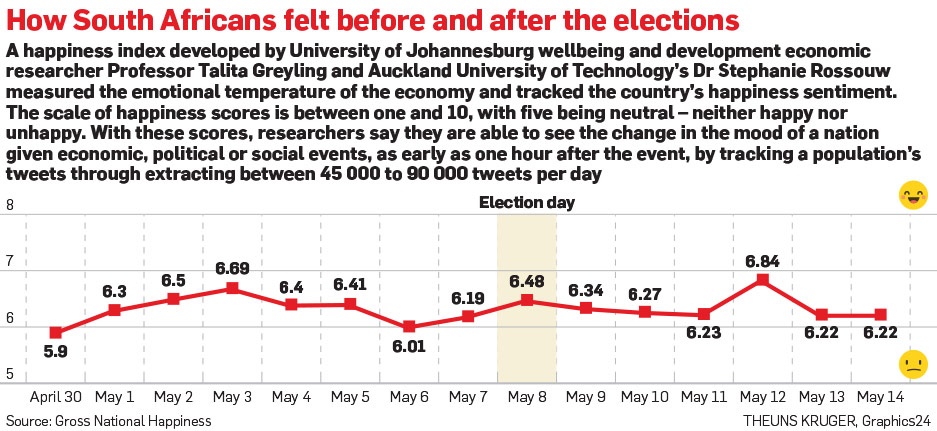
Your emotive tweet could be among the close to 90 000 tracked daily to measure whether South Africans are happy or not.
Ground-breaking research on the subject of gross national happiness (GNH), conducted by University of Johannesburg wellbeing and development economics researcher Professor Talita Greyling, is under way to measure the happiness of South Africans.
Greyling and a colleague at New Zealand’s Auckland University of Technology, Dr Stephanie Rossouw, have developed a “happiness index” that measures the emotional temperature of the economy and tracks the country’s happiness sentiment using data from Twitter.
The current research question being investigated by these two researchers measures the relationship between GNH and elections – in other words, the relationship between political events and happiness.
This is done by measuring happiness in real time using sentiment analysis, which is applied to a live feed of tweets.
The project was launched at the end of last month in South Africa, a week before the national general election, and this week in New Zealand and Australia, which both had their elections this week.
Locally it is set to continue to track locals’ contentment specifically during the days leading up to the inauguration of President Cyril Ramaphosa on Saturday.
According to the researchers, the term GNH is used to refer to the level of happiness of a group of citizens or nations.
It is the subjective equivalent of a measure like gross domestic product (GDP).
The best-known happiness measures to date are the Gallup World Happiness Index (WHI), the World Value Survey and the Happy Planet Index.
The researchers said South Africa was ranked at position number 106 out of about 156 countries this year with a score of 4.7, according to the WHI.
Greyling told City Press that their research was the “first of its kind” because of its use of Twitter and that their findings could be used by government to gauge sentiments in the country.
She explained that they tracked South African Twitter users and extracted between 45 000 and 90 000 tweets per day.
They analysed the tweets by using a software program that analysed all tweets made on a particular day using very sophisticated “sentiment analysis” and would then come to a conclusion as to whether the Twitter user was happy or not.
This research currently does not take into account the gender, race or economic class of Twitter users.
“Our purpose is to determine sentiment in South Africa. It is absolutely necessary to know the prevalent sentiment of a country in order to track the wellbeing of a nation,” she said.
Governments are able to influence GNH through the institutional and policy frameworks they establish.
The links between governments and GNH can operate in both directions: what governments do affects GNH, and in turn, the GNH of citizens in most countries determines what kind of governments they support.
“Government must realise that if it wants to improve the wellbeing of people, it needs to measure it. If it does not measure wellbeing it cannot manage it. Currently, government has no measure of wellbeing. It is using GDP, which is a measure of income – and has been found over and over again to not be a valid measure of wellbeing.”
Traditionally, Greyling said, economists measured the wellbeing of people or a nation by using objective economic indicators such as GDP. However, these indicators merely measure specific conditions believed to lead to a good life.
Greyling said the use of their data was the future, especially because of the vast number of observations that could be made with it, and because it had the benefit of measuring the “mood” in almost real time.
“Why would we neglect to measure every day when this reveals the emotions and feelings of the people – thus the real measure of their wellbeing?
“We all know that the assumption of humans as being rational and therefore making rational decisions is not entirely accurate. We are emotive beings and our emotions govern our decisions. If governments insist on ignoring the happiness of their people, they do so at their own economic peril,” she said.
TALK TO US
Do you want your government to take your happiness into account when making policy decisions?
SMS us on 35697 using the keyword HAPPINESS and tell us what you think. Please include your name and province. SMSes cost R1.50. By participating, you agree to receive occasional marketing material




 Publications
Publications
 Partners
Partners









